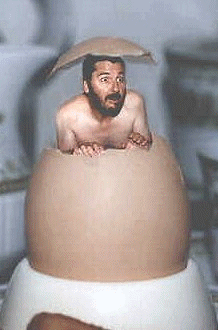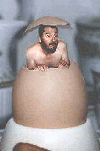| LinkExchange Member | Free Home Pages at GeoCities |
| LinkExchange Member | Free Home Pages at GeoCities |



By David Tacey


Graphic by Rem Holesworthy

MEN are changing, gradually, and not only because feminism is hurrying them along the road to development. I see a kind of internal revolution in the hearts and minds of men, but this often escapes the notice of social scientists, who sometimes view men as fixed cogs in a patriarchal machine, rather than as living individuals with inner lives of their own.
Now that women are rightly refusing to be burdened with the emotional projections of men, now that women are playing an increasing role in the workplace and can no longer afford to carry the "other half" of men's lives, men are being thrown back upon themselves. We are being introduced to a realm of emotion and feeling that, as a gender, we have not been prepared for, neither by our fathers nor by social history.
Of course, some men are performing badly at this new emotional task. The socalled SNAG or Sensitive New Age Guy is already a laughing stock of our time, and a personification of ineptitude and ineffectuality in the media. The SNAG is the man who has stripped off the Ned Kelly armor, who has responded to the changed demands and tastes of the age, yet who has lost touch with his masculinity in the process. He stands naked and forlorn, and today no one wants to own him let alone love him. He doesn't manage his emotions well, but often wallows in them, and he can never decide what to wear, how to feel, or who to be.
Some men have mistakenly assumed that they must replace the old-style masculinity with pure sensitivity: They have moved from one extreme to another, which is just as undesirable. However, the real task is not to throw out masculinitv and become feminine, but to sift through the masculinity of the past, rejecting those aspects that are domineering, overpowering, or exaggerated, while maintaining and redeeming the positive elements of the old ideal, including resourcefulness, courage, independence, reliability and moral sinew. To these redeemed or reconstructed elements, the modern man has to add sensitivity and emotional expressiveness. Perhaps this is a tall order, hut it is the way ahead.
I think there is a New Man in the making, and this New Man is a mixture of the best of traditional masculinity, plus the sensitivity and emotional expressiveness that is being demanded in today's environment.
Modern men are discovering that there Is more to life than what has previously been admitted under the banner of traditional masculinity: Men are in the slow process of winning back for themselves the life of the heart, feeling, and emotion - a world that was hitherto repressed, ignored -, or experienced only through projection upon their female partners. In Australia, until fairly recently, the social ideal of masculinity was personified by Henry Lawson's Noble Bushman. The bushman was laconic, (he didn't say much), stoical (never complained, little expression of feeling), and had manly endurance,(completed a project without concern about personal well-being). But today, given our new therapeutic and expressive ethic, these traits are no longer idealised.
In Australia, until fairly recently, the social ideal of masculinity was personified by Henry Lawson's Noble Bushman. The bushman was laconic, (he didn't say much), stoical (never complained, little expression of feeling), and had manly endurance,(completed a project without concern about personal well-being). But today, given our new therapeutic and expressive ethic, these traits are no longer idealised.
Laconicism can be viewed as self imposed alienation, stoicism as paranoid self-reliance, and manly endurance as overachievement linked to poor self-esteem. The new ethic demands that men break out of the iron-clad Ned Kelly mask and open their hearts to life. The SNAG will sometimes say in his defence: "But I have done what women have asked for".
The SNAG will sometimes say in his defence: "But I have done what women have asked for".
In recent years, women have pleaded with us to become more sensitive, more expressive of our feelings; now they turn around and say we are not attractive to them any more because we have lost our masculinity. Our newly discovered sensitivity is described as wimpishness. The popular men's movement's attempts to redeem the positive masculinity of the past can all too easily end up looking like a backlash against feminism. That is, when reclaiming the positive masculine heritage; the modern man has to be careful to be critical of the past, and to be alert to change and real transformation. Otherwise, we won't have the New Man at all, just a rehashed version of the patriarchal past, or just a Born-Again Bloke.
The popular men's movement's attempts to redeem the positive masculinity of the past can all too easily end up looking like a backlash against feminism. That is, when reclaiming the positive masculine heritage; the modern man has to be careful to be critical of the past, and to be alert to change and real transformation. Otherwise, we won't have the New Man at all, just a rehashed version of the patriarchal past, or just a Born-Again Bloke.
The SNAG is a kind of false start, a rather weak parody of the new kind of man who must appear if masculinity is to be positiveiy transformed. But the New Man will be closely scrutinised, carefully watched, and he will have more than his fair share of critics. This is to be expected, since masculinity is now "the problem", and many of the world's political and environmental ills are being attributed to an unrepentant and conquistadorial masculinity. The manly thing to do, in the current situation, is to experiment with new varieties of masculinity, not to be too thin-skinned about the inevitable criticism, and to aim for a wholeness of character in which the virtues of the past are brought together with the demands of the present.


Writen for The Age , Wednesday November 19, 1997.


 Please mail any comments and suggestions to:
robink@mail.austasia.net
Please mail any comments and suggestions to:
robink@mail.austasia.net

HAVE A LOOK AT SOME OF THE OTHER GREAT ESSAYS WE'VE FEATURED!

